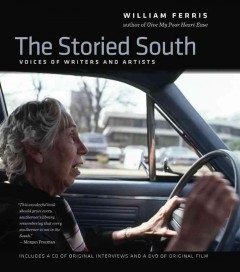Major Works
- The Storied South: Voices of the Writers and Artists (2013)
- Give My Poor Heart Ease: Voices of the Mississippi Blues (2009)
- Talking With the Turners: Conversations With Southern Folk Potters with Charles R. Mack and Lynn Robertson 2006
- State of the Blues: The Living Legacy of the Delta with John Lee Hooker and Jeff Dunas (Hardcover – Jun 15, 2005)
- “You live and Learn. Then You Die and Forget It All”: Ray Lum’s Tales of Horses, Mules, and Men (1992)
- The Encyclopedia of Southern Culture (1989) co-editor with Charles Reagan
- Local color: A sense of place in folk art (1982)
- Images of the South: Visits with Eudora Welty and Walker Evans (1978)
- Blues from the Delta (1970)
- Mississippi Black Folklore
- Images of the South
- Afro-American Folk Art and Crafts
- Folk Music and Sound
Films
- Two Black Churches
- Four Women Artists
- Mississippi Delta Blues
- Bottle Up and Go
- Made in Mississippi
- Give My Poor Heart Ease (2009)
- Painting in the South
- Black Delta Religion
- I Ain’t Lyin’
- Fannie Bell Chapman, Gospel Singer
- James “Son Ford” Thomas; Delta Blues Singer
- Green Valley Grandparents
- Mississippi Blues (1983)
- The Color Purple (1985) consultant
- Crossroads (1985) consultant
Sound recordings
- Highway 61 Blues: James ‘Son’ Thomas (1983)
- Bothered All the Time (1983)
- Genesis: The Beginnings of Rock (1974)
- Blues from the Delta (1970)
Biography of William R. Ferris
by Jimmy Crowell (SHS)
William Ferris has a distinguished career as an author, folklorist, filmmaker and academic administrator which covers thirty years. William Ferris was born in Vicksburg, Mississippi, in 1942, he attended Brooks High school in North Andover, Massachusetts. He received a bachelor’s degree from Davidson College, a Master’s degree in English literature from Northwestern University, and a Master’s and Ph.D. in folklore from the University of Pennsylvania. Dr. Ferris taught at Yale University from 1972 to 1979 and at Jackson State University from 1970 to 1972.
In 1979 Dr. Ferris became the head of the Center for the Study of Southern Culture on the campus of the University of Mississippi in Oxford, Mississippi. He served that post for eighteen years, building the center into to a distinguished institution. He established the Oxford Conference for the Book, the annual Faulkner and Yoknapatawpha Conference, and conferences on Elvis Presley, civil rights and the law, and civil rights and media among other cultural programs. The center has in its possession the largest blues archive in the world and has, because of the research conducted there, been a source for a wide range of audio recordings, films, scholarly papers, and books (neh.fed). In 1997 William Ferris was named chairman of the National Endowment for the Humanities by President Bill Clinton(Kelley, 1A).
Dr. Ferris’s honors include the Charles Frankel Prize in the Humanities given to him by President Bill Clinton, France’s Chevalier and Officer in the Order of Arts and Letters, the American Library Association’s Dartmouth Medal, and the Mississippi Institute of Arts and Letters Award (neh.fed).
Ferris has family in both Warren County and Oktibbeha County, Mississippi. He has four siblings. Shelby is an artist known internationally for jewelry design. Hester is a mother/homemaker with varied interests. Grey is a statesman, one of the leaders in the Mississippi Senate and chairman of the education committee, and Martha is a photographer, artist, and accomplished actress . She has appeared in feature films and television series such as L.A Law and Hill Street Blues (Smith, 109). The Starks and the Reynolds of Oktibbeha County are related to Ferris by his grandmother’s family . His grandfather graduated from Mississippi A & M (now Mississippi State University) in Starkville in the 1890’s while General Stephen D. Lee was the president of the school (Ferris). According to William Ferris, Betsy Stark still lives in the Ferris family home in Starkville, so he has many ties to Starkville!
 William Ferris joined the history department of the University of North Carolina where he teaches courses in Southern Literature and Oral Tradition and Southern Music. He holds the Joel Williamson Eminent Professor of History chair and is Senior Associate Director of CSAS and Adjunct Professor in the Curriculum in Folklore. He is also senior associate director of the Center for the Study of the American South at the University of North Carolina at Chapel Hill. Ferris, former chairman of the National Endowment of the Humanities, has written or edited many books and created fifteen documentary films. In 2006 he published Talking With the Turners: Conversations With Southern Folk Potters with Charles R. MacK and Lynn Robertson.
William Ferris joined the history department of the University of North Carolina where he teaches courses in Southern Literature and Oral Tradition and Southern Music. He holds the Joel Williamson Eminent Professor of History chair and is Senior Associate Director of CSAS and Adjunct Professor in the Curriculum in Folklore. He is also senior associate director of the Center for the Study of the American South at the University of North Carolina at Chapel Hill. Ferris, former chairman of the National Endowment of the Humanities, has written or edited many books and created fifteen documentary films. In 2006 he published Talking With the Turners: Conversations With Southern Folk Potters with Charles R. MacK and Lynn Robertson.
Give My Poor Heart Ease: Voices of the Mississippi Blues was published in November, 2009. His most recent book, The Storied South: Voices of the Writers and Artists, was published by the UNC Press in August of 2013. Altogether, he has written eleven books and fifteen documentary films. He also co-edited with Charles Wilson the Encyclopedia of Southern Culture (UNC Press, 1989), which was nominated for a Pulitzer Prize.
According to Tom Maxwell in IndyWeek in March, 2015, “The 73-year-old UNC professor has spent six decades becoming Southern culture’s chief documentarian. Equally at home on Mississippi state work farms or in college lecture halls, Ferris has broken some of America’s biggest racial divides to collect tales of a sometimes-hidden history. It’s a story he likes to share, too.”
Reviews
A Review of Mule Trader
by Jimmy Crowell (SHS)
Mule Trader, written by William Ferris, is the story of Ray Lum’s life trading horses, mules, and cattle from the Pacific Ocean to the Atlantic Ocean. William Ferris wrote this book to educate people about a time and culture long ago and offer a window into that time. Lum commonly offered this advice, “You live and learn, then you die and forget it all” (176).. One of his biggest fears was that what he had learned would be forgotten. William Ferris does a wonderful job presenting and preserving all of Ray Lum’s stories.
Ray Lum was born in Rocky Springs, Mississippi, in 1891. He lived in a large family with eight siblings. His father was a cattle driver. Lum picked cotton at age eight to help the family income. He enjoyed being outdoors and hunting. His knowledge of the outdoors and animals helped him in the trading business. In 1903, the Lum family moved to Vicksburg, Mississippi, where Lum worked as a delivery boy and later became the town dogcatcher. He began to learn the tricks of the trading business early when, at the age of twelve, he sold his first horse. When tractors began replacing mules in farming, many livestock dealers were looking for a way out of the business, so they sold their barns and livestock to Lum at very good prices. At the age of twenty-one Lum’s business became very profitable. The barns in Vicksburg became the base of a business that was to include many states and many decades. Lum won contracts with the government to supply the Army Corps of Engineers with the mules that built the levees of the Mississippi River and its many tributaries. In 1917 Lum moved to Memphis and took a job as auctioneer for Darnell and Barry, one of Memphis’s leading auction houses, and by the age of twenty-six, Lum was one of the city’s finest auctioneers.
Lum continued his own trading during this time. He bought mules in Memphis and sent them down the Yazoo-Delta railroad to his barns in Vicksburg and the surrounding areas. When Lum moved to Texas, it was the beginning of a major expansion in his business that included Mississippi and Texas. His wife Ellie Lum accompanied him to Texas, and they shared an apartment in Fort Worth. Lum liked Texas, “where the air was thinner, the rattlesnakes struck faster, and the horses bucked harder” (106). In Texas, Lum met or saw many famous people, including Will Rogers, Frank James, Pretty Boy Floyd, Judge Roy Bean, and the famous partners in crime, Bonnie and Clyde.
As farmers in California began to use tractors widely, Lum bought their mules and sent them back to the South. The spread of tractors went from west to east, and Lum continued to buy the unwanted mules and ship them east until even farmers in Mississippi were using tractors. In the 1950’s Lum got out of the mule business and began to sell cattle. Lum owned a tack store in Vicksburg until his death.
This biography of Ray Lum is a joy to read. The many stories of mules and deals are so vivid because of Lum’s distinct manner of speaking. It seems as though Lum knew everybody and did everything. With each story he tells, he has a lesson to teach with it. Lum was an honest man in a business known for cheats. He agreed with Will Rogers’s saying, “I never met a man I didn’t like.” Lum traded with everyone, no matter what kind of a man he was. He did not try to judge a man because he did not know what makes a man do what he does. Ray Lum was a man that you want to meet and William Ferris brings him to life.
An Interview with William Ferris (2000)
by Jimmy Crowell (SHS)
What high school did you attend?
Ferris: Brooks School in North Andover, Massachusetts
Who is your favorite author?
Ferris: William Faulkner
What author has influenced you the most?
Ferris: Eudora Welty
Why did you decide to write the book Mule Trader?
Ferris: To capture the life and words of a man I grew up listening to and admired greatly.
When did you become interested in writing?
Ferris: I became interested in writing when I was in high school. I began writing short stories and poetry.
Was there something in particular that got you interested in writing?
Ferris: I wanted to create work of my own and loved the idea of capturing voices from my imagination on paper.
What kind of a student were you in high school and college?
Ferris: I was an average student with a B in most of my classes.
Do you have any advice for future writers?
Ferris: Follow your heart and write what you feel you know best.
Do you have any advice for students today?
Ferris: Aim for the sky and never compromise yourself.
How has living in Mississippi influenced your writing or the way you live?
Ferris: Mississippi has helped me appreciate the importance of being human and of respecting all people.
Are you currently working on a new book?
Ferris: Yes.
What is it called?
Ferris: It is a collection of interviews with writers, artists, and musicians who have worked on the American South. I have not selected a title for the book yet.
When will it be published?
Ferris: I have still not finished writing the book.
Related Websites
- Tom Maxwell’s article in March, 2015, entitled For six decades, folklorist Bill Ferris has broken some of the country’s biggest racial barriers. Now, he’s sharing the South’s story with the world.
- William Ferris’s faculty page at the Center for the Study of the American South at UNC.
- Ferris became chairman of National Endowment for the Humanities in 2001.
- Professor captures South in song and photos capture the spirit of blues by Judith Katz 2009. Quoted from The Daily Tar Heel
- UNC folklorist shares his love for blues music Recalls his time in Mississippi by Brittany Johnson
- Q&A with Bill Ferris about his new book, “The Storied South: Voices of Writers and Artists“Return to Top
Bibliography
- Cox, James L. Mississippi Almanac 1997-1998. 1997. 127
- Ferris, William R. Mule Trader. New York: Anchor books,1992
- Kelley, Michael. “Folklorist Ferris Ready to Try Culture of Washington.” Commercial Appeal. 12 Nov. 1997: 1A
- Kniffel, Leonard. “Our Most American Institution: The New NEH Chair on Libraries.” American Libraries. Sept. 1998: 44-47.
- Smith, Pepper. “Roots and Wings.” Mississippi. November/December 1998: 109-114.
- WILLIAM R. FERRIS: Chairman, National Endowment for the Humanities. [Online] Available http://www.neh.fed.us/html/ferris.html


